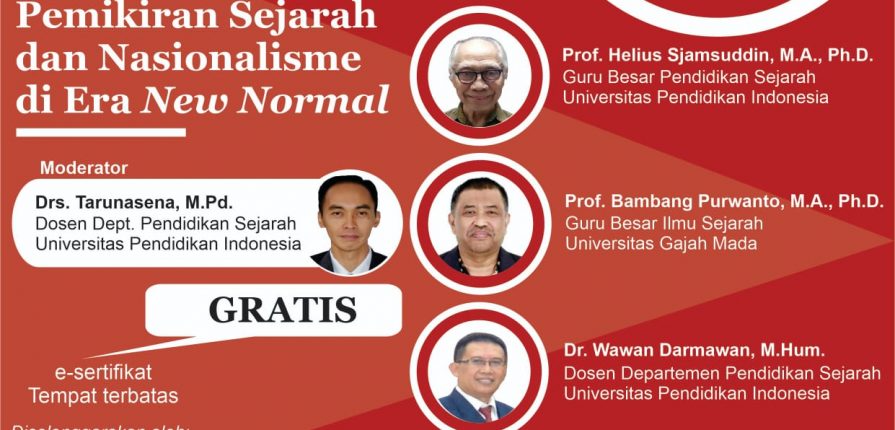The UPI Department of History Education held a national online seminar on Wednesday, July 1, 2020, titled “Historical Thought and Nationalism in the New Normal Era.” Speakers at the workshop, among others, Prof. Dr. Bambang Purwanto (Professor of History UGM), Prof. Dr. Helius Sjamsuddin (Professor of History Education at UPI), and Dr. Wawan Darmawan (University of Education Indonesia0).
The following will describe the presentation of Prof. Dr. Bambang Purwanto. In his presentation, Prof. Dr. Bambang Purwanto explained that the development of information technology had convinced many people that humans in the 21st century seem to live in a world without boundaries and distances. The recent global pandemic has undermined this belief; entering the third decade of the 21st century, humans are now living “wrestling in the distance.” Boundaries and distances are a reality in a space without limits and distance.
In history, the soldiers who descended on the battlefield, in addition to being equipped with the best equipment and strategies to protect themselves and win the war, many of them also wore necklaces to protect themselves from harm. They were entering the third decade of the 21st century when advances in digital technology and scientific rationality have grown tremendously. In Indonesia, the global pandemic presented the latest controversial phenomenon in the form of the “eucalyptus anti-coronavirus” necklace initiated by official state institutions.
If today’s “eucalyptus anti-coronavirus” necklace is read as an “anti-coronavirus eucalyptus amulet,” then we must accept that the present cannot be separated from the reality that has existed in the past without having to be in a causal relationship. Fact in principle is not single-dimensional. Without distance and boundaries that are believed to be a reality in the present, it is also accompanied by spaces and edges present as reality. That means conceptually, the fact of the past can also be reread when we want to present historical truths framed by the correct methodology.
Indonesia as a national identity is cultivated for its existence, not something that is obtained as a hereditary inheritance. Before the emergence of a new awareness that responds to the reality of colonialism and the structural and cultural elements that run it, Indonesia has not yet existed as an identity and a shared national entity.
Indonesian nationalism was an incredible invention of the colonized people who wanted to have a new shared identity, as an alternative to colonial identity, without losing the historical roots of the processes that preceded it. Indonesian nationalism takes local pre-colonial political realities as inspiration, not converting it entirely from the previous one into a new national identity.
Therefore, historically, the Proclamation of Independence on August 17, 1945, Pancasila, the Republic of Indonesia, and the 1945 Constitution, must be seen as the embodiment of the political, philosophical, constitutional, and constitutional reality of Indonesian nationalism. Indonesian nationalism is dynamic, historical, and visionary, which contains political facts and social, cultural, mentality, thought, and even economics.
In the perspective of Indonesian-centric historiography, there is no concept of decolonization as understood in the colonial-centric hegemonic literature and the orientalism tradition. Indonesian independence is a rational choice decided by the Indonesian people who were born earlier than their country, not the result of a decolonization process that places the colonial rulers as the subject and Indonesia as the object.
After proclaiming its independence, Indonesian nationalism underwent a further transformation process in decolonization, changing the colonial order into a new order for an independent and sovereign state and nation within the framework of building a new world civilization. In such a way, Indonesian nationalism is freed from its ahistorical nature and, at the same time, adapts to changes that continue to occur.
The 1955 Asia-Africa Conference was an example of the embodiment of Indonesian nationalism, which was reformulated as a response to changes in the world order that occurred but remained historical. The economic articles in the 1945 Constitution and the adoption of the cooperative system are other examples of the embodiment of Indonesian nationalism in the space of an independent Indonesia, which has strong roots from past experiences. When living life in the 21st century, the essential nature of Indonesian nationalism must be understood no longer as it was initially formed in the colonial space. Indonesian nationalism is no longer the same as during the first 50 years of independence when the transformation from colonized subjects to citizens had not yet occurred entirely. The state was always present as the dominant actor or even tended to be the only one who declared himself entitled to nationalism.
Recent globalization, the development of information technology, and the internal democratization process in a broad sense have brought a civil society whose existence is equal to the state, which the government politically represents. In Indonesia, the disaster and most recently the Covid-19 global pandemic has shown the presence of community (nation) nationalism in the form of socio-cultural solidarity, which, even to a certain extent, has carried out several functions that are usually carried out by the state.
However, all of this is not supported by historiography and the teaching of history that has existed so far. Indonesia’s historical narrative is formal, historiographical, focused on the state’s role as an institution and marginalizing the nation as a sociological category. The country’s history is political history, where other aspects such as economic, cultural, or social are only interpreted as part of the political history process that the state goes through.
The process of forming PKU Muhammadiyah is one of the classic examples of civil society nationalism when natural disasters are converted into communal solidarity beyond sacred space to build modern institutions. The historical process that Hasyim As’yari and A. Wahab Hasbullah went through with NU, Ki Hajar Dewantara with Taman Siswa, and the role of Salawati Daud in Sulawesi are other examples of the existence of civil society nationalism in Indonesian history.
Indonesian nationalism should not only be presented as political history. Historical facts can be read and reinterpreted as the historical truth of Indonesian nationalism. Methodologically, offering nationalism within the social and cultural history framework will provide a more complete, inspiring, and relevant picture of nationalism during ongoing changes and new challenges.
Indonesian nationalism is not understood in the “new normal” space. Still, it returns to everyday reality, as so many nation children have lived the historical process of nationalism since they were in the colonial historical area until independence. Historiographical errors have resulted in the legacy of the nation’s historical narrative, far from reality when historical construction only legitimizes a state without a country (the people).
It is rarely realized that one of the essential lessons from Indonesian history, when the state became hegemonic, the state and its political activities became the sole actor in the space of nationalism, and at the same time marginalized nationalism outside the state. In this hegemonic nationalism, it is almost difficult to distinguish between anarchy and authoritarianism with order or sovereignty.
The attitude of solidarity and tolerance packaged in sustainable actions and has national and international impact should not be separated from Indonesian nationalism. Building national awareness is not just creating hatred for “political rebels” or just positive patriotic attitudes against the invaders, but forgetting about the space and actors of nationalism that has changed from time to time.
Now we are faced with methodological challenges, both historiographical and historical learning. The history of nationalism is no longer the history of the state and the government that runs it but also the history of the daily life of every citizen and society. The history of Indonesian nationalism should contain about Mukibat and Mujair, the founders of cassava and fish who changed Indonesian culture’s production and consumption patterns to this day.

